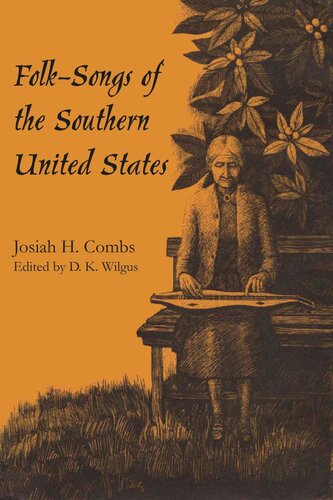

Most ebook files are in PDF format, so you can easily read them using various software such as Foxit Reader or directly on the Google Chrome browser.
Some ebook files are released by publishers in other formats such as .awz, .mobi, .epub, .fb2, etc. You may need to install specific software to read these formats on mobile/PC, such as Calibre.
Please read the tutorial at this link: https://ebookbell.com/faq
We offer FREE conversion to the popular formats you request; however, this may take some time. Therefore, right after payment, please email us, and we will try to provide the service as quickly as possible.
For some exceptional file formats or broken links (if any), please refrain from opening any disputes. Instead, email us first, and we will try to assist within a maximum of 6 hours.
EbookBell Team

4.8
104 reviews“The spirit of balladry is not dead, but slowly dying. The instincts, sentiments, and feelings which it represents are indeed as immortal as romance itself, but their mode of expression, the folksong, is fighting with its back to the wall, with the odds against it in our introspective age.” This statement by Josiah Henry Combs is that of a man who grew up among the members of a singing family in one of the last strongholds of the ballad-making tradition, the Southern Highlands of the United States. Combs was born in 1886 in Hazard, Kentucky, the heart of the mountain feud area—a significant background for one who was to take a prominent part in the “ballad war” of the 1900s. Combs’s intimate knowledge of folk culture and his grasp of the scholarly literature enabled him to approach the ballad controversy with common sense as well as with some of the heat generated by the dispute. Although in the early twentieth century there was probably no more controversy about the nature of the folk and folksong than there is today, it was a different kind of controversy. Many theories of the origins of folksong current at that time, such as the alleged relationship of traditional ballads to “primitive poetry,” did not take into account contemporary evidence. Combs said, “Here as elsewhere, I go directly to the folk for much of my information, allowing the songs, language, names, customs . . . of the people to help settle the problem of ancestry. . . . In brief, a conscientious study of the lore of the folk cannot be separated from the folk itself.” Folk-Songs du Midi des États-Unis, published as a doctoral dissertation at the University of Paris in 1925, was an introduction to the study of the folksong of the Southern Appalachians, together with a selection of folksong texts collected by Combs. Folk-Songs of the Southern United States, the first publication of that work in English, is based on the French text and Combs’s English draft. To this edition is appended an annotated listing of all songs in the Josiah H. Combs Collection in the Western Kentucky Folklore Archive at the University of California, Los Angeles. The appendix also includes the texts of selected songs. The aim of this edition is to make the contents of the original volume more readily available in English and to provide an index to the Combs Collection that may be drawn upon by students of folksong. The book also offers texts of over fifty songs of British and American origin as sung in the Southern Highlands.